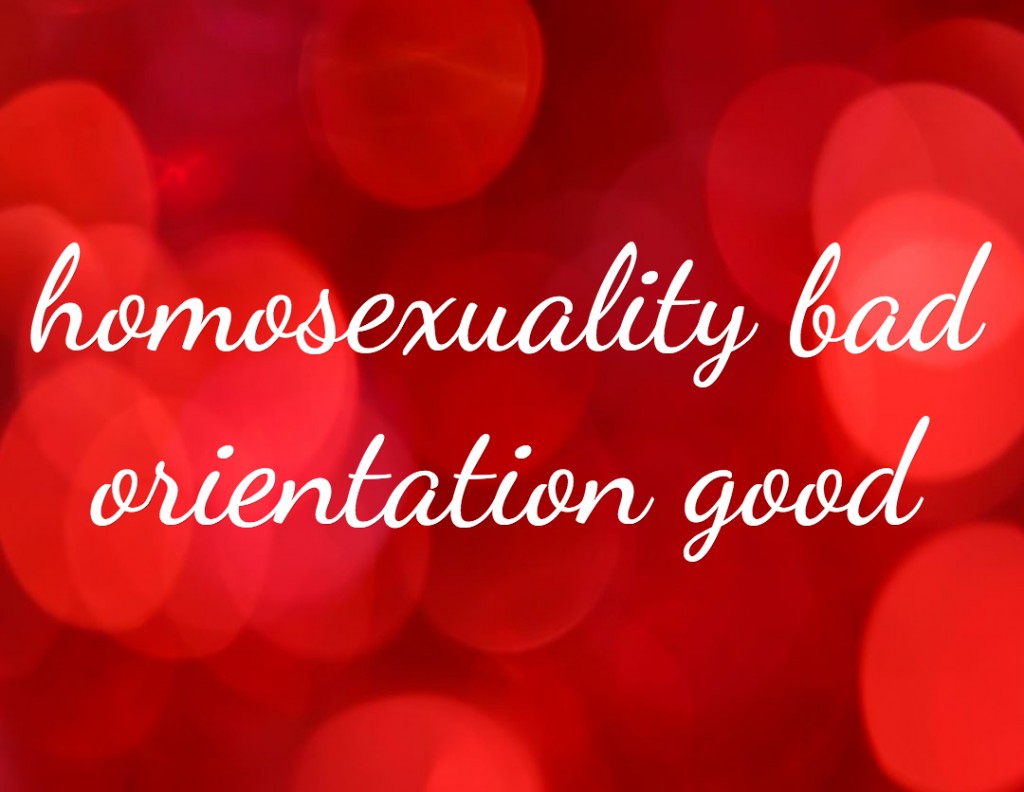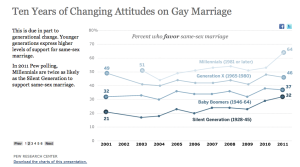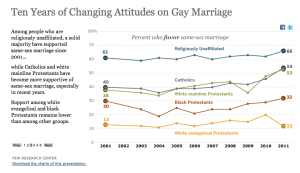
My friend Ben tipped me off to this posting on the problems with using the word “homosexuality” with the debate/conversation/argument (pick however you engage this) over the gay community, sin, marriage, etc.
Years ago one of my friends had shared with me that ‘he was gay and not homosexual’ and would rather I not use the term homosexual (or homosexuality). So out of respect and trying to be a peace maker in all these conversations I’ve tended to identify someone as ‘gay’ or reference the greater group as ‘gay community’. I hope that I did that well.
Justin in his “The Problem with “Homosexuality”“ puts out some rather helpful, and oddly common sense, words for a more healthy way of framing a gay, lesbian, bi-sexual sexuality conversation.
There are basically four different things someone might mean when they say “homosexuality,” and they are often confused.
1. Orientation. A person’s orientation tells you only who they are emotionally and physically attracted to. I call myselfgay because that is my orientation: I’m attracted to guys, not girls. People don’t choose their orientation. Some people use the word temptations to describe their orientation.
2. Lust. A lot of people confuse orientation with lust, but they’re not the same thing at all. Lust is more than just being attracted to someone; it has to do with how you respond to those attractions in your mind. Lust is a sin regardless of whether you’re lusting for women, men, or even your neighbor’s snazzy new car. The same Greek word translated lust in the Bible also means covet. (More on this in another post.)
3. Sex. This is really what most people are talking about when they say that “homosexuality is a sin.” They mean that they disapprove of gay sex, but to someone like me, it sounds like you just disapprove of my unchosen orientation.
4. Relationship. When gay people talk about wanting to get married, it’s not sex they’re after, but rather, a relationship.Just as straight people (hopefully) don’t get married for the sex, gay people don’t either; we want love, commitment, understanding, and someone to come home to at night and talk about our day. For Christians who disapprove of gay sex, a challenging question can be how to respond to gay relationships. If there’s no sex in the relationship but there is romance, is it still acceptable? And would you assume two gay people are having sex if you see them holding hands? (Would you assume a straight couple is having sex if you see them holding hands?)
I said that there are four main things someone might mean when they talk about homosexuality, but there’s actually a fifth one. For many folks (and I confess this was true of me as well for years), the word homosexuality conjures up images of debauchery, promiscuity, and the worst stereotypes of the gay community (my insert of video helping to perpetuate this point). But of course, that’s not what it is to be gay at all, just as images of Mardi Gras don’t convey what it is to be straight.
So next time you hear someone tell you what their view of homosexuality is, challenge them to be more specific. What are they really talking about?
Whether you are a gay affirming or condemning person it seems beneficial to us all that we understand the implied meaning on the words we are using. We might just come to place of understanding with each other
NOTE: I often get asked about curriculum for churches and youth groups in approaching gay rights and spirituality. My best suggestion to answer this question is the “This I Know” study. Personally I think it should be a youth and adult series as both groups would benefit from hearing from each other while talking through the study sessions. The movie they companion with “For the Bible Tells Me So” is also available on Netflix (at least the last time I checked). The film in itself is a great discussion starter.

